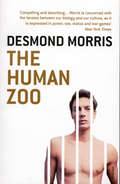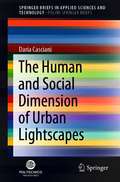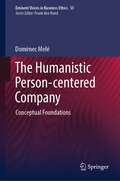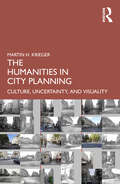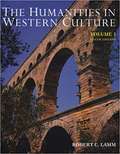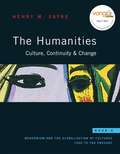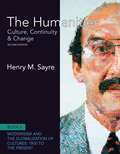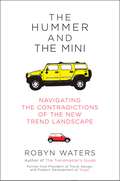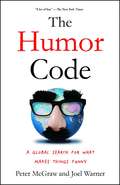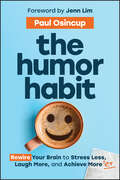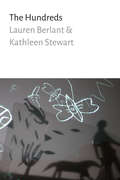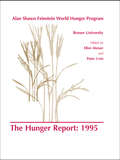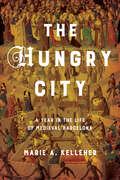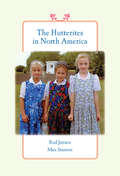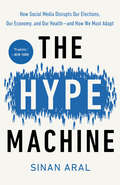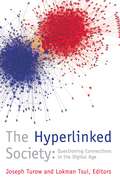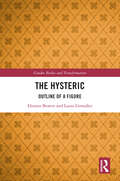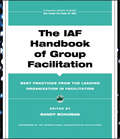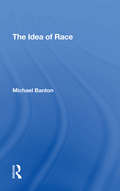- Table View
- List View
The Human Zoo
by Desmond MorrisA must-read for anyone who has ever wondered why people do what they do, from the popular author of The Naked Ape.This study concerns the city dweller. Morris finds remarkable similarities with captive zoo animals and looks closely at the aggressive, sexual and parental behaviour of the human species under the stresses and pressures of urban living.‘Compelling and absorbing...Morris is concerned with the tension between our biology and our culture, as it is expressed in power, sex, status and war games’ New York Times
The Human and Social Dimension of Urban Lightscapes (SpringerBriefs in Applied Sciences and Technology)
by Daria CascianiThis book explores new criteria and characteristics for integrating human psychology in the design of modern urban lighting. It identifies a new area of lighting design research and practice that focuses on the nocturnal urban experience in terms of people’s emotional, cognitive and motivational perceptions to achieve more accessible, sociable and sustainable cities. In turn, the book compares new tools and research methodologies for tackling complex issues concerning the ties between lighting, people and the city. Moreover, it presents a series of case studies to provide an in-depth understanding of the influence of urban lighting in terms of luminous atmosphere perception, positive social affect, social enhancement, accessibility and hospitability. Lastly, the book proposes a multidisciplinary qualitative and quantitative methodology for assessing the spatial experience of outdoor lighting.
The Humanistic Person-centered Company (Issues in Business Ethics #55)
by Domènec MeléHumanism in business is not only an alternative to economism but a way to human excellence. Humanism presented here revolves around the rich notion of “human person”, keystone of modern personalist philosophy and Catholic Social Teaching. From this perspective this book is offered to everyone, believer and nonbeliever alike. The person-centered humanism considers the human-wholeness, individual and relational, with subjectivity, self-determination, openness to transcendence, and with capacity not only to possess but also to give. It also highlights the uniqueness of each person, endowed with a high constitutive dignity and in continuous process of flourishing toward human plenitude. An attitude of respect and good will is due to non-personal beings, while persons deserve to be treated with justice and even with love of benevolence. The book is prepared in dialogue with mainstream of thought in business and business ethics and focused on exploring ways to improve some conventional views. It includes some proposals such as a person-based ethics, ethics understood as intrinsic to business activity, the consideration of the company as an organized community of persons, and the purpose of the company oriented toward the common good through a double mission, internal and external. It is also suggested substituting the notion of “stakeholder” for the richer one of “relationholder.”
The Humanities "crisis" And The Future Of Literary Studies
by Paul JayDemonstrating that the supposed drawbacks of the humanities are in fact their source of practical value, Jay explores current debates about the role of the humanities in higher education, puts them in historical context, and offers humanists and their supporters concrete ways to explain the practical value of a contemporary humanities education.
The Humanities in City Planning: Culture, Uncertainty, and Visuality
by Martin KriegerThis book by preeminent planning theorist Martin H. Krieger explores how cities are much more than their economies, demographies, or geographies. Planning today is dominated by social science, but Kreiger takes a different approach, thinking of city planning in terms of Culture, Uncertainty, and Visuality. The chapters explore planners and their role as protagonist in the humanities of literature and history; the inevitability of uncertainty in planning and how to face it; and how to attend to the physical, visual, and aural environment of the city. Through a series of essays, Krieger shows that cities are cultural and meaningful, that they are contingent and so filled with opportunity, and that they are concrete, particular, and encountered. The Humanities in City Planning will be of interest to students and scholars of the humanities and planning looking for alternative ways of viewing the city.
The Humanities in Western Culture: A Search For Human Values
by Robert LammThese two beautifully illustrated chronological volumes introduce your students to the arts of literature, sculpture, painting, architecture, music, photography, and film, and the philosophical ideas permeating ancient through modern civilizations. Packaged with supplemental Student Study Guides and audio cassettes to accompany each volume, this set provides an excellent all-in-one introduction to the humanities.
The Humanities: Modernism and the Globalization of Cultures, 1900 to the Present
by Henry M. SayreThe Humanities by Henry M. Sayre helps the reader see the context and make the connections across the humanities by tying together the entire cultural experience through a narrative storytelling approach.
The Humanities: Modernism and the Globalization of Cultures, 1900 to the Present (2nd Edition)
by Henry M. SayreThe Humanities by Henry M. Sayre helps the reader see the context and make the connections across the humanities by tying together the entire cultural experience through a narrative storytelling approach. For an undergraduate introductory level course in the humanities.
The Humans
by Stephen Karam"A kind, warm, beautifully observed and deeply moving new play, a celebration of working-class familial imperfection and affection and a game-changing work for this gifted young playwright."-Chicago Tribune"Karam is in rare form here, showing a remarkable ear for the way families converse... For all the characters' woes, this is a warm, funny, sharply observed portrait of their abiding connections with one another." -Time Out ChicagoBreaking with tradition, Erik Blake has brought his Pennsylvania family to celebrate Thanksgiving at his daughter's apartment in lower Manhattan. Unfolding over a single scene, this "delirious tragicomedy" (Chicago Sun-Times) by acclaimed young playwright Stephen Karam "infuses the traditional kitchen-sink family drama with qualities of horror in his portentous and penetrating work of psychological unease" (Variety), creating an indelible family portrait.Stephen Karam's plays include Speech & Debate and Sons of the Prophet, a finalist for the 2012 Pulitzer Prize and the winner of the 2012 Drama Critics Circle, Outer Critics Circle, Lucille Lortel and Hull-Warriner awards for Best Play. Born and raised in Scranton, PA, he lives in New York City.
The Hummer and the Mini: Navigating the Contradictions of the New Trend Landscape
by Robyn WatersFrom the former trendmaster of Target--how the power of contradictory trends can help reframe your business strategy Contradictions are everywhere! These days we wear Old Navy with new Gucci, Hanes T-shirts with Armani suits, couture Chanel with vintage denim. Suburban mansions are filled with flea market finds, and we show off our Michael Graves teakettle from Target on Viking stoves in our gourmet kitchens that might even include cabinets purchased from IKEA. When Robyn Waters began her career in the late 1970s, a trend was defined as something that everyone wanted at the same time. Fashion and business magazines proclaimed what was "in" and what was "out." Back then, it was fairly easy for companies to determine the next big trend, and ride it all the way to the bank. In today's marketplace the "next big thing" has been replaced by a thousand next big things. And in order to discover what consumers are hungry for companies need to discover what's important...to them. Today a cookie cutter approach no longer works. Waters explains that for every trend there's an equally valid countertrend. In The Hummer and the Mini, Waters explores the new trend landscape and urges companies to stop looking for the one right answer in their industry. There are many good ways to design products, develop a line of goods, merchandise a store, or craft a marketing message. You can thrive by selling huge cars (the Hummer) or tiny ones (the Mini). You can turn something old into something new and desirable (the Vespa) or turn a commodity into a luxury (In-and-Out Burgers at the Oscars). You can even customize a product designed for the masses (personalized postage stamps) or sell less as more (Minute Clinics). Through lively tales of influential trends and countertrends, The Hummer and the Mini will show you how to live with the contradictions, make the most of the inconsistencies, and embrace the paradoxes of business as a source of fresh ideas.
The Humor Code: A Global Search for What Makes Things Funny
by Joel Warner Peter McGrawPart road-trip comedy and part social science experiment, a scientist and a journalist “shed fascinating light on what makes us laugh and why” (New York Post).Two guys. Nineteen experiments. Five continents. 91,000 miles. The Humor Code follows the madcap adventures and oddball experiments of Professor Peter McGraw and writer Joel Warner as they discover the secret behind what makes things funny. In their search, they interview countless comics, from Doug Stanhope to Louis CK and travel across the globe from Norway to New York, from Palestine to the Amazon. It’s an epic quest, both brainy and harebrained, that culminates at the world’s largest comedy festival where the pair put their hard-earned knowledge to the test. For the first time, they have established a comprehensive theory that answers the question “what makes things funny?” Based on original research from the Humor Research Lab (HuRL) at the University of Colorado, Boulder, and the pair’s experiences across the globe, The Humor Code explains the secret behind winning the New Yorker cartoon caption contest, why some dead baby jokes are funnier than others, and whether laughter really is the best medicine. Hilarious, surprising, and sometimes even touching, The Humor Code “lays out a convincing theory about how humor works, and why it’s an essential survival mechanism” (Mother Jones).
The Humor Habit: Rewire Your Brain to Stress Less, Laugh More, and Achieve More'er
by Paul OsincupDiscover and embrace the untapped power of your sense of humor In The Humor Habit: Rewire Your Brain to Stress Less, Laugh More, and Achieve More’er, veteran speaker, corporate trainer, and comedian Paul Osincup delivers a hilarious and effective new take on how to make yourself and your team more productive and resilient by focusing on the funny side of work and life. In the book, you’ll learn why humor isn’t an in-born quality you’re either born with or without. Instead, it’s a habit you can develop over time. You’ll find 100 ways to have more fun at work, methods to improve your resilience in dealing with adversity, and an explanation of the author’s “LAFTER” model that shows you how to leverage levity at work. You’ll also discover: The latest insights from contemporary positive psychology combined with timeless comedic techniques that enhance your wellbeing Strategies to help you battle “chronic seriousness,” a condition affecting virtually every professional, tradesperson, consultant, employee, manager, and business leader in the working world Ways to boost your team members’ brainpower and productivity using humorPerfect for managers, executives, team leads, directors, and other business leaders, The Humor Habit is the practical, hands-on guide to improved productivity that’s actually fun to read—and even more fun to implement.
The Hundreds
by Kathleen Stewart Lauren BerlantIn The Hundreds Lauren Berlant and Kathleen Stewart speculate on writing, affect, politics, and attention to processes of world-making. The experiment of the one hundred word constraint—each piece is one hundred or multiples of one hundred words long—amplifies the resonance of things that are happening in atmospheres, rhythms of encounter, and scenes that shift the social and conceptual ground. What's an encounter with anything once it's seen as an incitement to composition? What's a concept or a theory if they're no longer seen as a truth effect, but a training in absorption, attention, and framing? The Hundreds includes four indexes in which Andrew Causey, Susan Lepselter, Fred Moten, and Stephen Muecke each respond with their own compositional, conceptual, and formal staging of the worlds of the book.
The Hunger Report 1995: The Alan Shawn Feinstein World Hunger Program, Brown University, Providence, Rhode Island
by Ellen Messer Peter UvinThe Hunger Report 1995 highlights progress during the past five years on the problems of food shortage, poverty-related hunger, maternal-child nutrition and health, and micronutrient malnutrition. It is constructed from papers and discussions presented at the five-year-follow-up to the Bellagio Declaration, 'Overcoming Hunger in the 1990s' (1989). Individual essays by hunger researchers, monitors, and policy makers assess advances in achieving the Bellagio goals, which are: 1) to end famine deaths, especially by moving food into zones of armed conflict; 2) to end hunger in half the world's poorest households; 3) to eliminate at least half the hunger of women and children by expanding maternal-child health coverage; and 4) to eliminate vitamin A and iodine deficiencies as public health problems.
The Hungry City: A Year in the Life of Medieval Barcelona (Medieval Societies, Religions, and Cultures)
by Marie A. KelleherThe Hungry City is the story of medieval Barcelona, retold through the lens of food and famine. Between the summer of 1333 and the spring of 1334, severe weather-related grain shortages spread throughout the Mediterranean, and Barcelona's leaders struggled to bring food to the city as its residents grew increasingly desperate. Employing the perspectives of historical actors whose stories are drawn from the records of that catastrophic year, Marie A. Kelleher uses Barcelonans' varied responses to crisis in the food system to present multiple ways of understanding the city—as a physical space, as the center of a network of Mediterranean commerce, as one powerful entity within a broader monarchy, as a site of religious encounter, and as a complex social body. Even as the central figure in each chapter offers their own version of the city, the separate strands of these multiple Barcelonas intertwine to reveal the fabric of the city as a whole.The medieval city was defined by its network of human relationships—between its rulers and ruled; its merchants, artisans, and laborers; its religious and secular authorities; its insider and outsider groups—and by its overlapping local and regional geographies. Barcelona in the fourteenth century was no different, and The Hungry City draws together multiple lives and narrative strands to focus on a single point in time, what one Catalan chronicler referred to as "the first bad year," providing a dynamic new perspective on the history of Barcelona and the medieval Mediterranean.
The Hungry Mind
by Susan EngelDespite American education's mania for standardized tests, testing misses what matters most about learning: the desire to learn in the first place. Susan Engel offers a highly readable exploration of what curiosity is, how it can be measured, how it develops in childhood, and how educators can put curiosity at the center of the classroom.
The Huron: Farmers of the North (Second Edition)
by Bruce G. TriggerOne of the case studies in cultural anthropology designed to bring to students, in beginning and intermediate courses in the social sciences, insights into the richness and complexity of human life as it is lived in different ways and in different places.
The Hutterites in North America (Young Center Books in Anabaptist and Pietist Studies)
by Rod Janzen Max StantonOne of the longest-lived communal societies in North America, the Hutterites have developed multifaceted communitarian perspectives on everything from conflict resolution and decision-making practices to standards of living and care for the elderly. This compellingly written book offers a glimpse into the complex and varied lives of the nearly 500 North American Hutterite communities.North American Hutterites today number around 50,000 and have common roots with and beliefs akin to the Amish and other Old Order Christians. This historical analysis and anthropological investigation draws on existing research, primary sources, and over 25 years of the authors' interaction with Hutterite communities to recount the group's physical and spiritual journey from its 16th-century founding in Eastern Europe and its near disappearance in Transylvania in the 1760s to its late 19th-century transplantation to North America and into the modern era. It explains how the Hutterites found creative ways to manage social and economic changes over more than five centuries while holding to the principles and cultural values embedded in their faith.Religious scholars, anthropologists, and historians of America and the Anabaptist faiths will find this objective-yet-appreciative account of the Hutterites' distinct North American culture to be a valuable and fascinating study both of the religion and of a viable alternative to modern-day capitalism.
The Hype Machine: How Social Media Disrupts Our Elections, Our Economy, and Our Health--and How We Must Adapt
by Sinan AralA landmark insider&’s tour of how social media affects our decision-making and shapes our world in ways both useful and dangerous, with critical ideas on how to protect ourselves in the 2020 election and beyond &“The most important book of the year . . . a lively, engaging masterpiece.&”—Erik Brynjolfsson, bestselling co-author of The Second Machine AgeMIT professor Sinan Aral isn&’t only one of the world&’s leading experts on social media—he&’s also an entrepreneur and investor, giving him an unparalleled 360-degree view of the technology&’s great promise as well as its outsize capacity to damage our politics, our economy, and even our personal health. Drawing on two decades of his own research and business experience, Aral goes under the hood of the biggest, most powerful social networks to tackle the critical question of just how much social media actually shapes our choices, for better or worse. Aral shows how the tech behind social media offers the same set of behavior-influencing levers to both Russian hackers and brand marketers—to everyone who hopes to change the way we think and act—which is why its consequences affect everything from elections to business, dating to health. Along the way, he covers a wide array of topics, including how network effects fuel Twitter&’s and Facebook&’s massive growth to the neuroscience of how social media affects our brains, the real consequences of fake news, the power of social ratings, and the impact of social media on our kids.In mapping out strategies for being more thoughtful consumers of social media, The Hype Machine offers the definitive guide to understanding and harnessing for good the technology that has redefined our world overnight.
The Hyperlinked Society: Questioning Connections in the Digital Age
by Lokman Tsui Joseph Turrow"Links" are among the most basic---and most unexamined---features of online life. Bringing together a prominent array of thinkers from industry and the academy, The Hyperlinked Society addresses a provocative series of questions about the ways in which hyperlinks organize behavior online. How do media producers' considerations of links change the way they approach their work, and how do these considerations in turn affect the ways that audiences consume news and entertainment? What role do economic and political considerations play in information producers' creation of links? How do links shape the size and scope of the public sphere in the digital age? Are hyperlinks "bridging" mechanisms that encourage people to see beyond their personal beliefs to a broader and more diverse world? Or do they simply reinforce existing bonds by encouraging people to ignore social and political perspectives that conflict with their existing interests and beliefs? This pathbreaking collection of essays will be valuable to anyone interested in the now taken for granted connections that structure communication, commerce, and civic discourse in the world of digital media.
The Hysteric: Outline of a Figure (Gender, Bodies and Transformation)
by Eleanor Bowen Laura GonzálezExamining historical, clinical and artistic material, in both written and visual form, this book traces the figure of the contemporary hysteric as she rebels against the impossible demands made upon her. Exploring five traits that commonly characterise the hysteric as an archetype – a specific body, mimetic abilities, a shroud of mystery, a propensity to disappear and a particular relationship to voice – the authors shed light on what it means to be hysterical, as a form of rebellion and resistance. This is important reading for scholars of sociology, gender studies, cultural studies and visual studies with interests in psychoanalysis, art and the characterisation of mental illness.
The I in Team: Sports Fandom and the Reproduction of Identity
by Erin C. TarverThere is one sound that will always be loudest in sports. It isn’t the squeak of sneakers or the crunch of helmets; it isn’t the grunts or even the stadium music. It’s the deafening roar of sports fans. For those few among us on the outside, sports fandom—with its war paint and pennants, its pricey cable TV packages and esoteric stats reeled off like code—looks highly irrational, entertainment gone overboard. But as Erin C. Tarver demonstrates in this book, sports fandom has become extraordinarily important to our psyche, a matter of the very essence of who we are. Why in the world, Tarver asks, would anyone care about how well a total stranger can throw a ball, or hit one with a bat, or toss one through a hoop? Because such activities and the massive public events that surround them form some of the most meaningful ritual identity practices we have today. They are a primary way we—as individuals and a collective—decide both who we are who we are not. And as such, they are also one of the key ways that various social structures—such as race and gender hierarchies—are sustained, lending a dark side to the joys of being a sports fan. Drawing on everything from philosophy to sociology to sports history, she offers a profound exploration of the significance of sports in contemporary life, showing us just how high the stakes of the game are.
The IAF Handbook of Group Facilitation
by Sandy SchumanSponsored by the International Association of Facilitators, The IAF Handbook of Group Facilitation offers the need-to-know basics in the field brought together by fifty leading practitioners and scholars. This indispensable resource includes successful strategies and methods, foundations, and resources for anyone who works with groups. The IAF Handbook of Group Facilitation provides an overview of the field for new and aspiring practitioners and a reliable reference for experienced group facilitators, including chapters on Creating positive ongoing client relationshipsBuilding trust and improving communicationsFacilitating group brainstorming sessionsDrawing out the best in peopleDeveloping a collaborative environmentDesigning and facilitating dialogueManaging conflicting agendasWorking with multicultural groupsUsing improvisationUnderstanding virtual meetingsFacilitating team start-upAssessing group decision processes Building expertise in facilitationReviewing core facilitation competenciesModeling positive professional attitudes
The IT Professional's Guide to Researching a New Industry
by Tom TaulliIT is a booming sector that is a key part of any industry. As a result IT professionals of all backgrounds and specialisms could find themselves working in almost anything from insurance to entertainment. Navigating your way around the job market can be a tricky task; you need to know where to look and what questions to ask to ensure that you make the right decisions about your career. This quick and practical guide will help you navigate the huge range of industries for which IT is becoming essential. With ideas and tips to help you with your research, this book will get you asking the right questions to guide you towards the industry in which you can thrive. Get the insider knowledge on your next industry with this quick and incisive book. It will enable you to find information you need to feel confident and happy in whatever industry you decide to work. This handy companion will be useful every step of the way as you research the business world, providing you with advice and information to be confident in your career decisions. It will show you how to begin your research, giving you the lowdown on industry categorization so can orient yourself according to where you want to be. It will then help you to ask the right questions, ensuring that you know exactly what you need to. Finally it will provide you with clear and practical tips as well as the best tools and places to look on and offline to make your research as stress-free as possible. From a sympathetic and knowledgeable author and full of tips and insight, this book will be a wise companion throughout your research. About the Author: Tom Taulli is the author of numerous books, including All About Short Selling, All About Commodities, How to Create the Next Facebook: Seeing Your Startup Through, from Idea to IPO, and High-Profi t IPO Strategies: Finding Breakout IPOs for Investors and Traders. He also writes for publications such as Forbes.com and BusinessWeek.com. You can reach him at his blog Taulli.com.
The Idea Of Race
by Michael BantonThis book deals with the study of race relations as a general body of knowledge which tries to bring together in a common framework studies of group relations in different countries. It explores the intellectual context within which the old conception of race relations arose.
